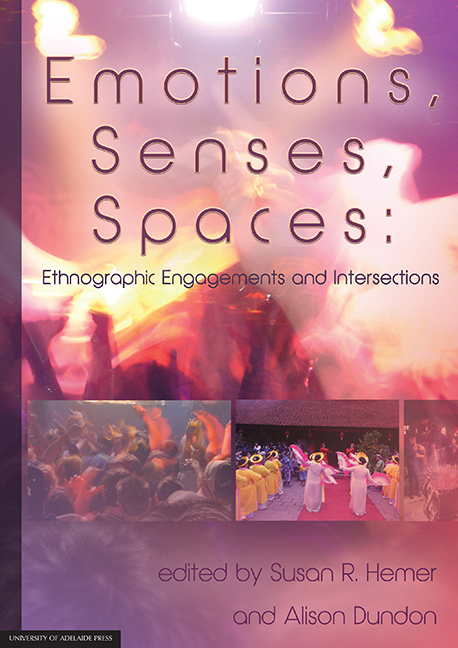Book contents
- Frontmatter
- Contents
- Biographies
- 1 Ethnographic intersections: Emotions, senses and spaces
- 2 ‘Dancing for joy’: Gender and relational spaces in Papua New Guinea
- 3 Creating the right ‘vibe’: Exploring the utilisation of space at Hip Hop concerts in Adelaide and Melbourne
- 4 Pontic dance: Feeling the absence of homeland
- 5 Emotional actors/Affective agents: Interspecies edgework and sociotechnical networks in the Spanish bullfight from horseback (rejoneo)
- 6 Sensual feasting: Transforming spaces and emotions in Lihir
- 7 Anxious spaces: The intersection of sexuality, the senses and emotion in fieldwork in Nepal
- 8 Interrupted research: Emotions, senses and social space in (and out of) the field
- 9 Voices in the park: The composition of sacred space and public place
- 10 Ngadha being-in-common: Emotional attachment to people and place in Flores, Indonesia
- 11 Trust your senses: Growing wine and making place in McLaren Vale
7 - Anxious spaces: The intersection of sexuality, the senses and emotion in fieldwork in Nepal
Published online by Cambridge University Press: 25 July 2017
- Frontmatter
- Contents
- Biographies
- 1 Ethnographic intersections: Emotions, senses and spaces
- 2 ‘Dancing for joy’: Gender and relational spaces in Papua New Guinea
- 3 Creating the right ‘vibe’: Exploring the utilisation of space at Hip Hop concerts in Adelaide and Melbourne
- 4 Pontic dance: Feeling the absence of homeland
- 5 Emotional actors/Affective agents: Interspecies edgework and sociotechnical networks in the Spanish bullfight from horseback (rejoneo)
- 6 Sensual feasting: Transforming spaces and emotions in Lihir
- 7 Anxious spaces: The intersection of sexuality, the senses and emotion in fieldwork in Nepal
- 8 Interrupted research: Emotions, senses and social space in (and out of) the field
- 9 Voices in the park: The composition of sacred space and public place
- 10 Ngadha being-in-common: Emotional attachment to people and place in Flores, Indonesia
- 11 Trust your senses: Growing wine and making place in McLaren Vale
Summary
Abstract
This chapter argues that personal sensorial and emotional experiences in fieldwork can be important for the acquisition of anthropological knowledge. Conducting research on gendered subjectivities and discourses of honour and shame in remote Western Nepal as a first‑time female fieldworker, I had a clear realisation of the intersection of senses, emotions and space. The Nepali lifestyle and lived spaces gave rise to a specific bodily praxis, in which corporeality, senses and emotions played an important role. In particular, being categorised as both woman and other attracted much unwanted sexual attention. As a result I ‘felt’ myself ‘in’ my body acutely, which at times gave rise to a high level of anxiety and awareness. My chapter will focus on this experience, which led me to feel and (re)act in certain ways. This relates to wider themes of gender, sexuality, comportment and honour in Nepali life, which are issues that Nepali women confront on a daily level. In the chapter, I explore the extent to which managing my visibility and ‘dulling the senses’ (see Desjarlais 1997) of sight and hearing as techniques of comportment and ease of movement during fieldwork had a significant impact on my understanding of how it ‘feels’ to be a woman in Nepal. This chapter will seek to explore the importance of such corporeal and emotional experiences of the intersection of senses, space and emotion in the acquisition of anthropological knowledge in ‘the field’.
Introduction
To feel like a woman in Nepal and feel like a woman in Australia are different experiences. In Australia as a woman I feel more confident, respected and carefree. It's almost shameful to say, but I never thought about what it meant to be a woman in Australia, what it feels like from the inside looking out at the world. In Nepal it is a completely different and embodied experience. In Nepal I mentally prepare myself as I step out of the house, my own private space.
- Type
- Chapter
- Information
- Emotions, Senses, SpacesEthnographic Engagements and Intersections, pp. 107 - 122Publisher: The University of Adelaide PressPrint publication year: 2016

